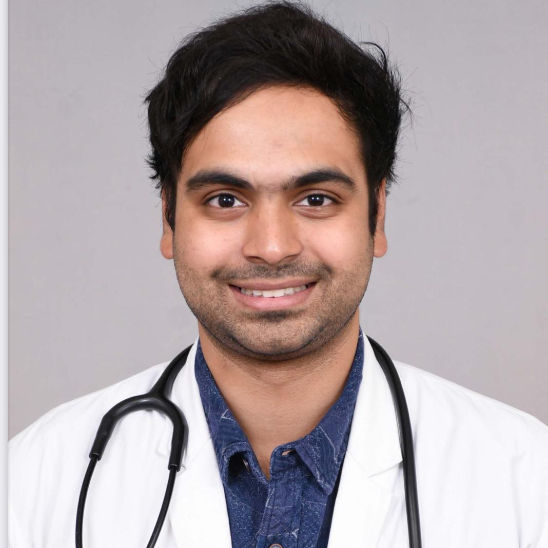Peptic Ulcer Prevention Strategies
Find out the scientifically proven peptic ulcer prevention strategies and improve your gut health. Know the types, causes and medications to keep it under check.

Written by
Last updated on 3rd Jul, 2025
A peptic ulcer is an open sore that develops when stomach acid erodes the innermost lining of the stomach or the small intestine. It is further classified into gastric ulcers and duodenal ulcers based on the advanced symptoms of the condition. Helicobacter pylori (H. pylori) infection is the main reason behind the development of this condition, but the excessive use of nonsteroidal anti-inflammatory drugs (NSAIDs), high-stress levels, and unhealthy dietary habits further contribute to worsening the situation. At the same time, lifestyle choices like alcohol consumption further increase the risk. Thus, understanding causes, and risk factors is crucial in adopting effective prevention strategies to maintain digestive health.
Understanding the Role of Helicobacter Pylori
A large population of the world carries H. pylori bacteria, but it does not harm them. Only adults with poor immunity and children suffer the most from it. This particular bacteria inflames and irritates the stomach and intestine lining by multiplying. Resultantly, the bacteria produce an enzyme, urease, which helps protect the bacteria. The multiplying bacteria eats the stomach tissue and leads to peptic ulcers.
There is a range of diagnostic tests available to detect H.pylori:
Stool Tests: It detects H.pylori in stool samples.
Breath Test: The patient is made to drink a solution and exhale in a packet. The test measures the carbon dioxide in the breath, and a higher level of it indicates the presence of H. pylori bacteria.
Upper Endoscopy: Here, a flexible tube is inserted down the mouth into the stomach, and some tissues are collected for testing.
Lifestyle Modifications to Prevent Peptic Ulcers
Peptic Ulcer prevention strategies are easy to follow and maintain. Following are some the tips one can consider:
Balanced Diet
One of the best ways to prevent peptic ulcers is to incorporate a healthy and balanced diet into daily life. This means adding vegetables, fruits, healthy fats, lean proteins, and whole grains to meals. At the same time, try avoiding processed food, spicy food, and fast food.
Regular Physical Activity
Regular physical activity is crucial to defeating peptic ulcers, as it releases the necessary enzymes to digest food. Also, bodily movement eases and regularises bowel movements and helps avoid constipation.
Avoidance of Alcohol and Smoking
Consumption of alcohol leads to the erosion of the inner lining of the stomach and intestine, making one susceptible to peptic ulcers. Similarly, the nicotine in cigarettes also weakens the digestive system and creates other health complications. So, leaving these two will remarkably improve gut health.
Consult Top General Gastroenterologist
Medications and Their Impact
Certain medications have adverse side effects on an individual's digestive health. Here is what you must know on this topic –
Nonsteroidal anti-inflammatory Drugs (NSAIDs) And Ulcer Risk
Constant use of medications like aspirin, naproxen, ibuprofen, etc., that fall under the category of NSAIDs cause severe ulcer risks to individuals, including children.
Safe Use of Medications to Prevent Ulcers
Medicines like antacids, Histamine H2 blockers, and Proton Pump inhibitors (PPIs) are some of the most potent options for blocking the gastronomic acids that treat peptic ulcers. However, a doctor's advice is mandatory for any medication and its correct dosage.
Dietary Recommendations for Peptic Ulcer Prevention
Selected dietary choices help prevent ulcer formation and improve digestive power. Here is a list of foods that you must include in your diet and the ones you should stay away from –
Foods to Include
Fibre-rich foods: Oats, brown rice, whole grains, apples, pears, carrots
Probiotic-rich foods: Yogurt, kefir, kimchi, sauerkraut, miso
Lean proteins: Skinless poultry, fish, tofu, legumes
Healthy fats: Olive oil, avocado, nuts, seeds
Vitamin A-rich foods: Sweet potatoes, spinach, carrots, kale
Vitamin C-rich foods: Oranges, strawberries, bell peppers, broccoli
Flavonoid-rich foods: Berries, apples, green tea, soybeans
Garlic and Honey: For their antibacterial properties
Foods to Avoid
Spicy foods: Chili peppers, hot sauces, black pepper
Acidic foods: Citrus fruits, tomatoes, vinegar-based foods
Fried and greasy foods: Fast food, deep-fried items, processed snacks
Carbonated beverages: Soda, sparkling water
Caffeinated drinks: Coffee, energy drinks, strong tea
Alcohol
High-sodium foods: Processed meats, canned foods, salty snacks
Chocolate
Red meat
Dairy (in some cases)
Stress Management Techniques
Besides dietary changes, keeping stress in check is also a crucial step to prevent peptic ulcers. Stress can trigger many digestive disorders, such as acid reflux, bloating, constipation, inflammation, indigestion, excess stomach acid, gas, heartburn, etc. All these can contribute to peptic ulcers in the long run.
One can practice relaxed breathing, such as yoga, daily journaling, cognitive behavioural therapy, relaxation therapy, and sharing with others, which work wonders to reduce and manage stress. It eventually helps prevent symptoms of peptic ulcers.
Monitoring and Regular Health Check-Ups
Regular health check-ups and monitoring of the vitals help detect any symptoms of peptic ulcers. Periodic screenings, especially for individuals with a history of ulcers or gastrointestinal issues, can help prevent complications such as bleeding ulcers or perforation.
Therefore, recognising the early symptoms like peptic ulcers, severe abdominal pain, weakness, bloating, etc., is important for timely intervention. With the help of appropriate medication, lifestyle changes and dietary adjustments, one can manage this condition and get better.
Role of Probiotics and Supplements
Probiotics are instrumental in balancing gastric mucosa for an ulcer patient and preventing the further advancement of peptic ulcer. The following are the merits of using probiotics for the prevention of peptic ulcers:
It helps reduce inflammation by limiting cytokine reactions.
Probiotics are capable of restoring the inner lining of the stomach.
They also boost the immune system of the patients.
Probiotics, in the long run, can reduce the amount of H.pylori in the stomach.
Besides medications, additional supplements like calcium and compounds like flavonoids, liquorice, aloe vera, cranberry, honey, etc., are some of the best natural supplements individuals can take to improve their digestive health.
Understanding the Importance of Hygiene and Sanitation
A lack of personal hygiene and poor sanitation can also contribute to developing peptide ulcers. Here are some ways to combat these:
Preventing H. pylori Infection: Bacteria can transmit from several places, such as shared utensils, unclean water sources, dirty hands, etc. Knowing the sources helps contain this bacteria.
General Hygiene Practices: Follow some simple tips to prevent peptic ulcers and bacterial contamination. These include drinking water from clean sources, washing hands before eating and eating properly cooked food. In addition to preventing peptic ulcers, these also help improve overall well-being.
Conclusion
Peptic ulcers may not be a fatal disease, but it has the potential to disrupt one’s digestive system and other bodily functions. Therefore, it is essential to adopt preventive measures that suit your lifestyle and needs. It begins with positive steps like dietary changes, maintaining hygiene, stress management, etc., that constitute a holistic approach to combating this disease and improving quality of life.
Consult Top General Gastroenterologist
Consult Top General Gastroenterologist

Dr. Jatin Yegurla
Gastroenterology/gi Medicine Specialist
11 Years • MD (PGI), DM (AIIMS Delhi), FAGIE (AIIMS Delhi), ESEGH (UK), Gold Medalist
Hyderabad
Apollo Hospitals Jubilee Hills, Hyderabad
(625+ Patients)

Dr Harish K C
Gastroenterology/gi Medicine Specialist
15 Years • MBBS MD DM MRCP(UK) (SCE-Gastroenterology and Hepatology)
Bengaluru
Apollo Clinic, JP nagar, Bengaluru

Dr. Chethan T L
General Physician/ Internal Medicine Specialist
5 Years • MBBS, MD, DNB (General Medicine)
Bengaluru
Apollo Medical Center, Marathahalli, Bengaluru

Dr Bhargav Vuppumalla
General Physician/ Internal Medicine Specialist
5 Years • MBBS MD GENERAL MEDICINE
Bengaluru
Apollo Medical Center, Marathahalli, Bengaluru

Dr. Arun N
Gastroenterology/gi Medicine Specialist
17 Years • MBBS, DNB PED , DM GASTRO
Chennai
Apollo Hospitals Greams Road, Chennai
(700+ Patients)
Consult Top General Gastroenterologist

Dr. Jatin Yegurla
Gastroenterology/gi Medicine Specialist
11 Years • MD (PGI), DM (AIIMS Delhi), FAGIE (AIIMS Delhi), ESEGH (UK), Gold Medalist
Hyderabad
Apollo Hospitals Jubilee Hills, Hyderabad
(625+ Patients)

Dr Harish K C
Gastroenterology/gi Medicine Specialist
15 Years • MBBS MD DM MRCP(UK) (SCE-Gastroenterology and Hepatology)
Bengaluru
Apollo Clinic, JP nagar, Bengaluru

Dr. Chethan T L
General Physician/ Internal Medicine Specialist
5 Years • MBBS, MD, DNB (General Medicine)
Bengaluru
Apollo Medical Center, Marathahalli, Bengaluru

Dr Bhargav Vuppumalla
General Physician/ Internal Medicine Specialist
5 Years • MBBS MD GENERAL MEDICINE
Bengaluru
Apollo Medical Center, Marathahalli, Bengaluru

Dr. Arun N
Gastroenterology/gi Medicine Specialist
17 Years • MBBS, DNB PED , DM GASTRO
Chennai
Apollo Hospitals Greams Road, Chennai
(700+ Patients)